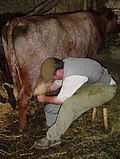Difference between revisions of "AY Honors/Milk a cow/en"
(Updating to match new version of source page) |
(Updating to match new version of source page) |
||
| (One intermediate revision by the same user not shown) | |||
| Line 2: | Line 2: | ||
Historically, the milking and the processing took place close together in space and time: on a dairy farm. [[Image:Milking-a-cow-past.jpg|thumb|120px|left|''Milking the old-fashioned way'']] People milked the animals by hand; on farms where only small numbers are kept, hand-milking may still be practiced. Hand-milking is accomplished by grasping the teats (often pronounced 'tits') in the hand and expressing milk by either squeezing the fingers, progressively, from the udder end to the tip or by squeezing the teat between thumb and index finger then moving the hand downward from udder towards the end of the teat. This is repeated, using both hands for speed. Both methods result in the milk that was trapped in the milk duct being squirted out the end into a bucket that is supported between the knees (or rests on the ground) of the milker, who usually sits on a low stool. | Historically, the milking and the processing took place close together in space and time: on a dairy farm. [[Image:Milking-a-cow-past.jpg|thumb|120px|left|''Milking the old-fashioned way'']] People milked the animals by hand; on farms where only small numbers are kept, hand-milking may still be practiced. Hand-milking is accomplished by grasping the teats (often pronounced 'tits') in the hand and expressing milk by either squeezing the fingers, progressively, from the udder end to the tip or by squeezing the teat between thumb and index finger then moving the hand downward from udder towards the end of the teat. This is repeated, using both hands for speed. Both methods result in the milk that was trapped in the milk duct being squirted out the end into a bucket that is supported between the knees (or rests on the ground) of the milker, who usually sits on a low stool. | ||
| − | Traditionally the cow, or cows, would stand in the field or paddock while being milked. Young stock, heifers, would have to be trained to remain still to be milked. | + | Traditionally the cow, or cows, would stand in the field or paddock while being milked. Young stock, heifers, would have to be trained to remain still to be milked. In many countries the cows were tethered to a post and milked. The problem with this method is that it relies on quiet, tractable beasts, because the hind end of the cow is not restrained. In cold countries where cows are kept in barns, at least for the winter if not throughout the year, they are still tethered only by the neck or head, particularly where they are kept in small numbers. |
| − | |||
| − | |||
<noinclude></noinclude> | <noinclude></noinclude> | ||
Latest revision as of 02:51, 15 July 2022
Historically, the milking and the processing took place close together in space and time: on a dairy farm.
People milked the animals by hand; on farms where only small numbers are kept, hand-milking may still be practiced. Hand-milking is accomplished by grasping the teats (often pronounced 'tits') in the hand and expressing milk by either squeezing the fingers, progressively, from the udder end to the tip or by squeezing the teat between thumb and index finger then moving the hand downward from udder towards the end of the teat. This is repeated, using both hands for speed. Both methods result in the milk that was trapped in the milk duct being squirted out the end into a bucket that is supported between the knees (or rests on the ground) of the milker, who usually sits on a low stool.
Traditionally the cow, or cows, would stand in the field or paddock while being milked. Young stock, heifers, would have to be trained to remain still to be milked. In many countries the cows were tethered to a post and milked. The problem with this method is that it relies on quiet, tractable beasts, because the hind end of the cow is not restrained. In cold countries where cows are kept in barns, at least for the winter if not throughout the year, they are still tethered only by the neck or head, particularly where they are kept in small numbers.

